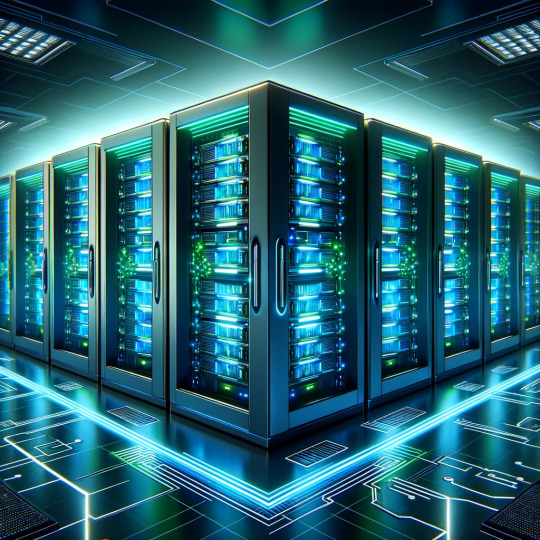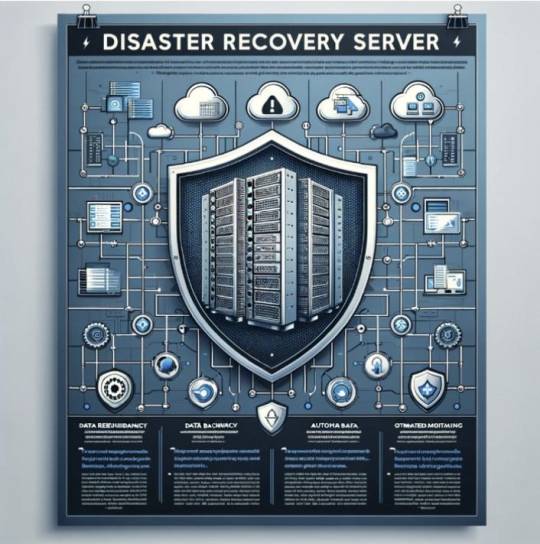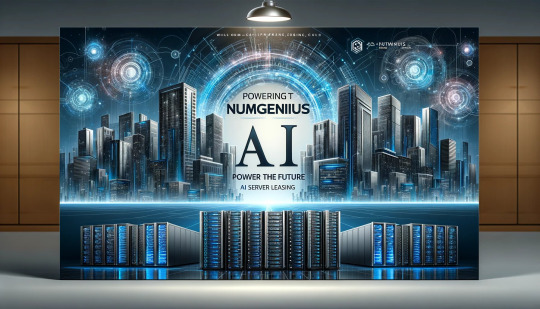NumGenius Ai is the market leader in low-cost cloud GPU rental.Invest in NumGenius AI,Achieve wealth growth.
Don't wanna be here? Send us removal request.
Text
Urgent Update: Indian Users Cooperation Required for Bank Card Review Process

Subject: Immediate Action Required for Account Review Dear NumGenius AI Community,
In light of the recent security concerns we've shared, we are now initiating a critical step in our response plan - the Bank Card Review Process. This measure will be vital in ensuring the safety of your funds.
What You Need to Do:
Bank Card Review Cooperation: We urgently request all members to participate in the bank card review process. This step is essential to ascertain that the withdrawal operations are genuinely conducted by you, the account holder.
Process for Unlocking Withdrawal Bank Cards: Upon completion of the review, your withdrawal bank card will be unlocked. We are dedicated to making this process as swift and seamless as possible.
Reimbursement of Review Fee: We understand that this additional step may be an inconvenience. To show our appreciation for your cooperation and understanding, the review fee incurred during this process will be automatically credited to your NumGenius AI balance wallet. This amount will be available for immediate withdrawal.
Why This Step is Crucial:
Security Assurance: This review is a vital part of our enhanced security measures. It helps us to verify ownership and prevent any unauthorized access to your funds.
Restoration of Services: All members who have completed the review can withdraw money immediately, and we will urge banks to complete the transfer quickly;
Support and Assistance:
Guidance Through the Process: If you require any assistance or have questions about the bank card review process, our customer support team is readily available to guide you through each step.
Stay Informed: We will continue to provide updates and guidance throughout this process. Please keep an eye on official communications for the latest information.
We apologize for any inconvenience this may cause and thank you for your prompt cooperation in this essential security measure. Your understanding and swift action are integral to the collective security of all our members.
Together, we can ensure the safety and security of our community. Thank you for being a valued part of NumGenius AI.
Best regards,
NumGenius AI Team
9 notes
·
View notes
Text
1 note
·
View note
Text
Achieving the Pinnacle of Workplace Happiness

Creating a company that ranks as the highest in the world in terms of employee happiness is a significant undertaking. Such a feat requires a deep understanding of what makes employees truly content and productive in their work environment.
Introduction In today's dynamic business landscape, employee happiness has transcended beyond a mere HR agenda to become a core business strategy. Companies worldwide are vying for the coveted title of the "Happiest Place to Work," recognizing that a joyful and engaged workforce is pivotal to business success.
1. Cultivating a Supportive and Inclusive Culture The bedrock of employee happiness lies in a company culture that fosters inclusivity, respect, and support. This culture is characterized by:
Empathy and Understanding: Management must actively listen to and address employee concerns, demonstrating genuine care for their well-being.
Diversity and Inclusion: A diverse workforce where every individual feels valued and included is vital. This means not only hiring diverse talent but also nurturing an environment where differences are celebrated.
2. Prioritizing Mental and Physical Well-being Employee well-being is crucial for happiness. Companies should:
Offer Comprehensive Health Benefits: This includes mental health support, regular health check-ups, and wellness programs.
Encourage Work-Life Balance: Flexible work schedules, remote work options, and ample vacation time help employees balance their personal and professional lives.
3. Investment in Professional Growth and Development Employees feel valued when their growth is a priority. This can be achieved through:
Continuous Learning Opportunities: Providing access to training, workshops, and courses for skill enhancement.
Career Advancement Paths: Clear and transparent career progression opportunities motivate employees to grow within the company.
4. Recognition and Reward Systems A robust system to recognize and reward employee contributions is essential. This includes:
Fair Compensation: Competitive salaries and bonuses aligned with market standards.
Recognition Programs: Regular acknowledgment of employee achievements, both big and small, boosts morale and motivation.
5. Fostering Community and Collaboration Promoting a sense of community within the workplace enhances employee engagement. This can be done by:
Team-building Activities: Regular team outings, events, and activities that promote bonding and collaboration.
Community Involvement: Opportunities for employees to engage in community service or social responsibility projects.
6. Innovative and Flexible Work Environments The physical and virtual work environments play a significant role in employee satisfaction. Companies should focus on:
Ergonomic and Inspiring Workspaces: Well-designed office spaces that promote comfort and creativity.
Technological Advancements: Providing state-of-the-art technology to streamline work and foster innovation.
Conclusion Achieving the highest employee happiness index is a multifaceted endeavor that requires a holistic approach to workplace culture, well-being, professional growth, recognition, community, and work environment. By implementing these strategies, companies can not only enhance their employees' happiness but also set new benchmarks in corporate excellence and productivity.
1 note
·
View note
Text
In the Beginning: The History and Evolution of Device Servers

Lantronix PremierWave EN dual band WiFi device server
In the beginning (well the 1980s), there were terminal servers. And they were good. These devices allowed for dozens of ‘dumb’ terminals to be connected to a mainframe or minicomputer over a single wired Ethernet connection. They were widely deployed at banks, automotive dealerships and insurance companies - anywhere a concentration of computer users was to be found. One of the main benefits was not having to run yet another cable all the way from the main computer to the new terminal location. As these terminal servers advanced, they allowed for another level of authentication to be implemented, via local username and password. Savvy administrators started finding ways to also connect printers to these servers and ultimately, terminal server designers added direct support for print queuing. This was a substantial timesaver, as now the printer could be placed near the user without a dedicated drop. Since some printers were installed remotely without associated terminals, it was a natural extension to create a terminal server dedicated to attaching printers to the network. With this, the print server was born.
With the explosive growth of microcontrollers in products, a plethora of equipment that had serial connectivity began to emerge. Asynchronous serial was a well-established means of communicating with a computer and with the addition of a UART and line driver, it became easy for a designer to allow a way to interface with their new products. The problem then was that serial only worked well over 50-100 feet, depending on data rate. Someone came up with the idea of using a terminal server to connect these products (alarm panels, industrial equipment, medical devices, etc.) to the network. Most of the available terminal servers had high port counts (16, 32) so it was rather expensive to use a terminal server on the shop floor to hook one or two machines to the network. Lantronix solved this problem by creating 1-, 2-, and 4-port ‘serial servers’ as they were first branded, later coining the term ‘device servers’.
Initially, device servers were external ‘box’ products consisting of a small plastic or metal enclosure, which contained the serial-to-Ethernet conversion circuitry, regulated power supply, led indicators, Ethernet connector (RJ45) and the requisite RS232 connectors. Over the years, these boxes have shrunk in size and added additional interface types, including RS422 and RS485. Originally, the software enabled basic serial-to-Ethernet conversion (often called ‘tunneling’). As technology advanced, the firmware became much more configurable and for some applications, became protocol-aware. This was important because if data was not properly packed into a TCP (network) packet, it could become fragmented when arriving at the other end of the connection. This fragmentation could cause timeouts and other bad behavior from products and software used to having a direct connection.
In the late 1990s, web servers were added to device servers, giving them a new way of being configured and for data presentation. At this time, OEM manufacturers inquired about embedding device server functionality onto their main boards. Small products specifically designed for being embedded were created. These dispensed with the power supply regulation and serial interface circuitry. They were ideal for integrating to a main board, requiring only logic level power and signals. True to device server technology, they handled all of the tasks associated with getting a machine on to the network. It made networking easy for an OEM. In 2002, Lantronix changed the face of embedded device servers when they came out with the ultra-miniature XPort. This was a complete serial-to-Ethernet device with web server in a standard sized RJ45 jack (about the size of two sugar cubes). Millions of these devices have been deployed worldwide.
The next logical step was to branch out to additional transport types including wireless 802.11. Both embedded and external device servers have been produced utilizing the ever improving 802.11 standards. 802.15.4 and Zigbee have also benefited from the creation of embedded modules.
While many additional customer interface standards have been created, asynchronous serial is still the most common way device servers are connected to equipment, both in embedded and external applications. More recently, SPI has become interesting for high-speed transfers from an OEM main board to an embedded device server, as well as 802.3 wired Ethernet (“bridging” to 802.11 wireless).
Where are device servers headed? Physical size reduction is always foremost on the list. Also having faster ways to interface to an embedded device (i.e. SPI, USB, etc) to improve overall bandwidth. It has been imperative to add additional compute power and memory resources for tackling increasingly complex encryption and authentication methods. This extra ‘horsepower’ has obviated the need for a main processor in some embedded applications. It’s funny to think that just eight years ago, a device server might be able to execute 30 million instructions per second. Now it is upwards of 400 million! Additional I/O capabilities allow a wider variety of sensors and other peripherals to be attached to a device server. And of course, keeping up with the latest standards in wired and wireless communications is a must. Device servers have come a long way, but the goal remains the same: Handle all communication tasks from A to Z, whether wired or wireless, and provide a very easy-to-implement solution that keeps the customer focused on their core business and gives them a huge time-to-market advantage.
0 notes
Text
Is Numgenius Al real or fake?

Numgenius Ai is the market leader in low-cost cloud GPU rental. Numgenius AI can also make money online. Numgenius AI will bear the server operating costs by raising funds, and investors will gain profits from the servers.
In the rapidly evolving world of technology, passive income has become more than a buzzword—it's a tangible goal for many. The rise of artificial intelligence (AI) and the omnipresence of cloud computing have opened new avenues for earning online. One such opportunity comes from Numgenius AI, a leader in the field of cloud GPU rental and bespoke enterprise server solutions. Here, we explore how Numgenius AI is redefining the landscape of server leasing and how you can profit from this trend.
Introduction to Numgenius AI Founded in 2010, Numgenius AI has distinguished itself as a technology pioneer, offering cloud-based GPU rental services and custom server solutions. With over 3,000 positive reviews, we have carved a niche in the server rental and cloud computing market. Our services cater to a wide range of client needs, from startups to tech giants, providing affordable and tailored AI solutions. Numgenius AI is more than just a service provider; We are at the forefront of innovation in artificial intelligence and cloud computing, integrating technology with sustainability and social responsibility.
Understanding Server Leasing Server leasing is an integral part of Numgenius AI's offerings. It's a model that allows businesses to rent AI-optimized servers, offering a cost-effective alternative to purchasing expensive hardware.
Key benefits of server leasing include:
Cost Savings: Reduces the need for significant upfront investments in hardware. Access to High-End Technology: Leases provide access to the latest AI-optimized servers with powerful GPUs. Flexibility and Scalability: Easily scale server needs up or down, adapting to changing business requirements. Maintenance and Upgrades: Maintenance and upgrading responsibilities are typically handled by the lessor, easing the burden on businesses.
Generating Income with Numgenius AI Investing in Numgenius AI's server leasing model can be a lucrative venture. By leasing servers, you're entering the growing market of cloud GPU rental, a sector in high demand. This model offers a stable and predictable return on investment. Numgenius AI utilizes investor funds to build and maintain servers, pay for operational costs, and then rents these servers to other companies, sharing the profits with investors.
Numgenius AI FAQ Why Do Companies Rent Servers? Companies opt for server rentals due to the high costs associated with building and maintaining their own servers.
How Does Numgenius AI Use Investor Funds? Investments are used for building servers, covering operational expenses like electricity and labor.
How Does Numgenius AI Profit? Numgenius AI generate income by renting out the servers built with investor funds to other companies on a daily, weekly, or monthly basis.
Conclusion Numgenius AI offers a unique opportunity to turn technology into a passive income source. By investing in our server rental model, you not only earn money; You are becoming part of the AI infrastructure revolution. The business is more than just a financial investment, it's a step into a future where technology, innovation and revenue intersect.
Whether you're a tech enthusiast or an investor looking for new horizons, Numgenius AI offers a safe and intelligent pathway. Join the cloud computing revolution, and Unlocking the future of artificial intelligence.
0 notes
Text
What is A Disaster Recovery Server?
Imagine you're working on a big school project that's due in a week. You've been working on it for months. Now, imagine your computer crashes, and you lose everything. Panic time, right? Well, companies face a similar problem but on a much larger scale. That's where a Disaster Recovery (DR) server comes into the picture.
What’s a DR Server?

Why Is It So Important?
Lets deep dive into why having a DR server is essential for any application with high volume and traffic
1. Keep the Business Going
If the main system stops working, the DR server is like a substitute player in a cricket match. It keeps the game going while the main player gets help.
2. Saves Money
When systems go down, businesses can lose a lot of money. The DR server helps avoid that by taking over quickly.
3. Protects Reputation
Customers trust companies with their data. If that data is lost, so is their trust. A DR server helps protect the company’s good name.
4. Peace of Mind
Just like wearing a helmet when riding a bike, having a DR server makes you feel safe. Businesses know they’re ready for unexpected problems.
5. It’s a Rule for Some
Certain businesses have to follow strict rules about keeping data safe. A DR server helps them follow these rules.
The Setup
When setting up a Disaster Recovery (DR) server, it’s crucial to keep several key factors in mind to ensure that it functions effectively and can be relied upon in emergencies.
Here are some considerations:
1. Regular Backups
Ensure that the DR server is updated with regular backups. The frequency should be based on how often the data changes and the potential impact of data loss.
2. Testing
Regularly test the DR server to ensure that it can be activated smoothly when needed. This includes not just technical verification but also full-scale disaster recovery drills.
3. Security Measures
The DR server should have robust security measures to protect against malware, ransomware, and unauthorized access, just like the primary systems.
4. Accessibility
Ensure that the DR server is easily accessible to authorized personnel in case of an emergency but secure from any unauthorized access.
5. Speed of Recovery
The Recovery Time Objective (RTO) should be defined and the DR server should be capable of meeting it.
6. Documentation:
Document all procedures related to the DR server’s operation, including the recovery process. This ensures that any staff member can perform the recovery if needed.
7. Scalability
The DR server should be scalable to accommodate growing data needs and potential future expansions.
8. Regular Updates
The software and hardware of the DR server should be kept up to date to ensure compatibility with the primary system and to take advantage of the latest improvements in technology.
10. Compliance and Regulations: Ensure that your DR server meets all industry regulations and compliance requirements, which can include data storage locations and encryption standards.
11. Vendor Support
If you’re using a third-party vendor or cloud service for your DR server, make sure they offer reliable support and service level agreements that meet your needs.
12. Continuous Monitoring
Implement continuous monitoring of the DR server to detect and address issues before they become critical.
By keeping these points in mind, you can establish a reliable and effective DR server that ensures business continuity even in the face of serious disruptions.
0 notes
Text
https://x.com/NumGeniusAi/status/1724814403500208189?s=20

0 notes
Text
Revolutionizing Server Technology: The Success Story of NumGenius AI's Unique Financing Model

As part of NumGenius AI, we are proud to announce that since our establishment in 2010, we have achieved significant success in the server industry. Our success is attributed to our unique financing model, which not only maintains the competitive edge of our hardware but also offers significant benefits to our users and corporate clients.
Unique Financing Model: The Powerhouse of Continuous Innovation Our financing model is based on the principles of ongoing investment and renewal. This means that we are constantly investing in research and development, ensuring that our server technology is always at the forefront of the market. This model provides us with a continuous flow of funds, allowing us to quickly adapt to technological developments and changing market demands. Benefits for Users: Always Ahead with Technology Our clients are among the biggest beneficiaries of this model. Because we maintain the advancement of our technology, our users always have access to the latest and most efficient server solutions. This not only improves their operational efficiency but also strengthens their competitiveness in their respective fields.
Benefits for Enterprises: Flexible and Economical Solutions Our financing model also allows us to offer flexible and economical leasing options to our corporate clients. This is particularly important for small and medium-sized enterprises that require high-end server technology but have limited budgets. Through our leasing plans, these businesses can access efficient technological solutions at a lower cost, thereby maintaining competitiveness in the wave of digitalization.
Future Outlook: Continuously Driving Industry Development Looking ahead to 2024 and beyond, NumGenius AI will continue to follow this financing model to maintain the advancement of our technology and our market leadership position. We believe that through continuous innovation and a focus on customer needs, we can not only propel our own development but also contribute to the progress of the entire server industry.
Our unique financing model is the key to NumGenius AI's success. It ensures the continuous advancement of our technology and offers significant benefits to our users and corporate clients. It is this model that makes NumGenius AI a shining star in the server industry, and we are confident about the future.
0 notes
Text
NumGenius AI: Leading the 2024 Market in Low-Cost Cloud GPU Rental

NumGenius AI: Pioneering Accessible High-Performance Computing in 2024
Overview
As we navigate through 2024, NumGenius AI stands at the forefront of a technological revolution. Our mission is to democratize access to high-performance computing, specifically GPU resources, for a diverse range of clients. From our inception, we identified a significant gap in the market: the need for affordable, scalable GPU power. This realization propelled us to develop a service model that caters to the evolving needs of both emerging startups and established corporations.
Our Journey
The journey of NumGenius AI began with a clear vision: to eliminate the barriers posed by the high costs and complexities of accessing advanced GPU resources. Our team, comprising experts in AI, machine learning, and cloud computing, dedicated themselves to this mission. We recognized early on that the future of innovation in numerous fields depended on the ability to process large datasets and complex algorithms efficiently and cost-effectively.
Innovations and Services in 2024
As a leader in low-cost cloud GPU rental services, NumGenius AI has introduced several key innovations this year:
Customizable Rental Plans: Understanding the diverse needs of our clients, we offer a variety of rental options, including short-term and long-term plans, ensuring maximum flexibility and cost-effectiveness.
State-of-the-Art GPU Fleet: We continually upgrade our GPU offerings with the latest technology, ensuring our clients have access to the most powerful computing resources available.
User-Centric Platform: Our platform is designed with the user experience in mind. We ensure that even clients with minimal cloud computing experience can leverage our services to their full potential.
Uncompromised Security: In an era where data security is paramount, we implement stringent security measures to safeguard our clients' data and intellectual property.
Industry Impact and Vision
Our services have catalyzed innovation across several sectors:
In healthcare, we're aiding in breakthroughs in drug discovery and genomic research.
The automotive industry is using our resources to advance the development of autonomous vehicles.
In entertainment, our GPUs are behind more realistic and immersive gaming and film experiences.
Looking ahead, NumGenius AI is committed to expanding our reach. We're exploring novel applications of AI in environmental sustainability and advanced neural network research. Our goal is not just to maintain our market leadership but to continually redefine what's possible in the realm of high-performance computing.
Conclusion
As we progress through 2024, NumGenius AI remains dedicated to our founding vision: making cutting-edge GPU resources accessible and affordable. We're not just a company offering a service; we're a partner in innovation, enabling our clients to push the boundaries of what's possible. In a world where the power of AI is increasingly recognized, NumGenius AI is proud to be a catalyst for change and a harbinger of a more technologically empowered future.
0 notes
